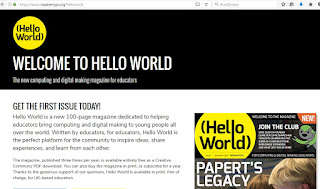Hello World is a new 100-page magazine dedicated to helping educators bring computing and digital making to young people all over the world. Written by educators, for educators, Hello World is the perfect platform for the community to inspire ideas, share experiences, and learn from each other.
Digital literacy
Digital literacy is not just about technical ability. The definition I most frequently use is digital literacy = functional technical skills + critical thinking + social engagement. It’s about critically and creatively engaging with online content and communities. Understanding bias, evaluating information, and checking facts become critical in a world where children and young people are not dependent on schools, parents, or carers for accessing or verifying knowledge. We need to ensure young people are developing the ability to navigate critically, review the content they come into contact with, find the content they need, and make use of what’s available to them.
Creativity, identity, community
The increasing opportunities for young people to engage creatively with computing and coding are very welcome, along with the availability of affordable devices, connectivity, and low-cost computers like the Raspberry Pi. There’s still more to do in relation to how we understand and champion young people’s creativity online. There’s no doubt that their activity online - creating, collaborating, and sharing - are creative acts. Importantly, young people are developing their identities online, and finding their voice and their place in the world. They create and recreate themselves: their tastes, views, values, and passions. By recognising the wide range of creative and social practices young people take part in every day online, and understanding the role of technical skills and awareness, we can perhaps start to see how we can help their habits positively contribute to both their own development, and to their physical and digital communities.

